January 11, 2018
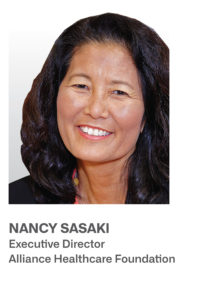 From Nancy Sasaki, Executive Director. Even with a holiday-shortened month, there was still a tremendous amount of work being done to advance the health and wellness for the most vulnerable in San Diego and Imperial Counties—those under 250% of the federal poverty level, un/underinsured people, children, and the homeless. Our collaborative efforts to serve these populations in the month of December are highlighted below.
From Nancy Sasaki, Executive Director. Even with a holiday-shortened month, there was still a tremendous amount of work being done to advance the health and wellness for the most vulnerable in San Diego and Imperial Counties—those under 250% of the federal poverty level, un/underinsured people, children, and the homeless. Our collaborative efforts to serve these populations in the month of December are highlighted below.
December 1
Finding ways to use technology to improve health outcomes is something that’s always on our minds. Today I had a chance to talk with Jill Balderson from Kaleido Health about their project to connect Planned Parenthood affiliates to telehealth opportunities in order to expand access to care.
December 4
Federal budget cuts that rarely make the news are impacting the way service providers reach the refugee community, so today Michele and I met with Linda Katz to discuss what she is learning about the impact of the new administration on refugee services. This led to discussions about diversity, equality, and inclusion. Michele and I look forward to learning more in the near future!
Improving the health and wellness of underserved populations is central to our mission, so later that day I met up with Jess Yuen who is coordinating efforts for the Promise Zone, a federally funded initiative designed to improve the lives of San Diego’s most disadvantaged and underserved communities. Last month Michele had a chance to take a bus tour around the Promise Zone to learn more about their work. Jess is also a colleague interested in the impact investing network in San Diego County as well as the Program-Related Investment (PRI) opportunities offered by our foundation.
Being a teenage mother can be physically and emotionally stressful for mother and baby alike, and reducing rates of teenage pregnancy can have a dramatic impact on individuals and the community at large. In the evening I had a terrific phone call with CEO Ginny Ehrlich and Chief Development Officer Scott LaGrand at Power to Decide and learned more about their work trying to reduce teen pregnancy. Formerly known as the National Campaign to Prevent Teen Pregnancy, Power to Decide is exploring ways to ensure businesses continue to fund access to birth control as an essential coverage benefit if changes to the Affordable Care Act restrict such access. With a potential focus in San Diego County, we talked about the benefits and challenges the campaign could face.
And to end the day, I forgot it was an ugly sweater winter social for San Diego Grantmakers, so off to CVS I went! I gathered what I could and felt appropriately “dressed” in my unsightly getup. What a fun time we had chatting and catching up on all things good in philanthropy. Thanks to CEO Nancy Jamison and the rest of the San Diego Grantmakers staff for hosting the event.
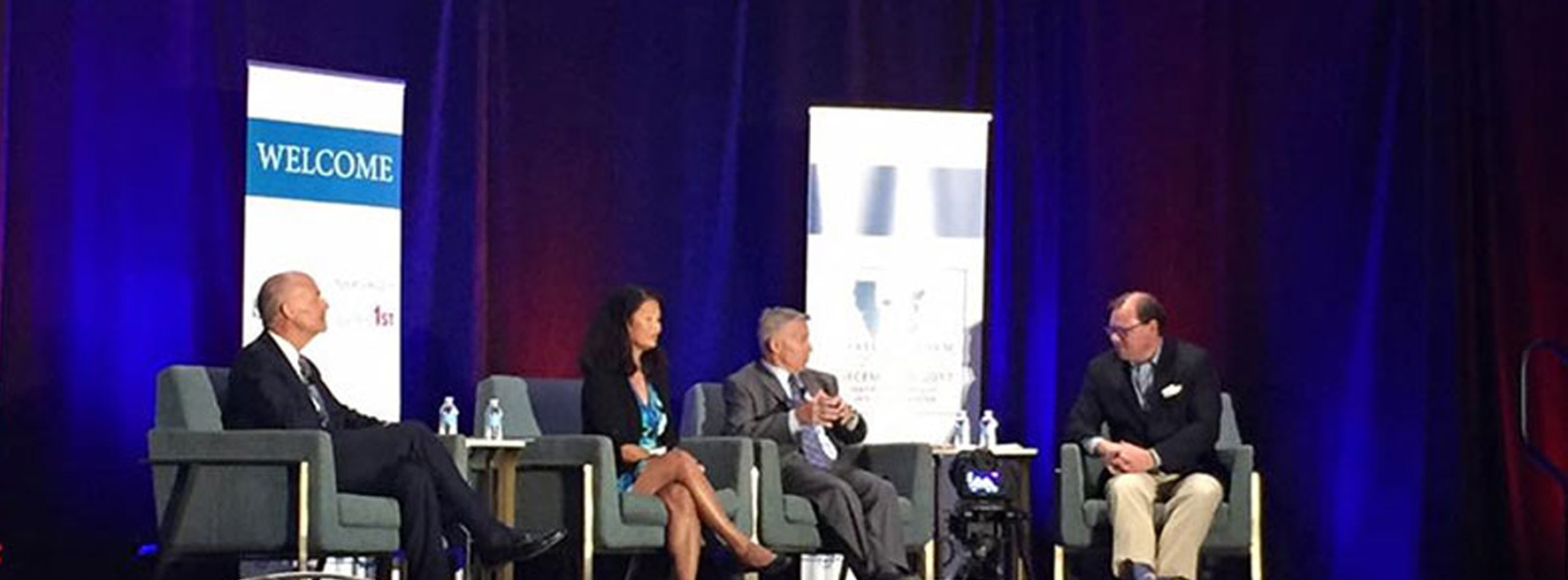
December 5
Michele and I attended the State of Reform Health Policy Conference to discuss and learn about ways to make healthcare more affordable and accessible for everyone in our region, and I sat on a panel to talk about what health reform could look like in San Diego County. Along with CEO Baron Herdelin-Dougherty of the Greater YMCA of San Diego County and CEO Donald Kearns of Rady’s Children’s Hospital, we discussed the need for stronger collaborations, a strategic vision for a culture of health, as well as the strength of the Live Well San Diego concepts of community health.
December 6
If we’re going to improve the health and wellness of underserved populations in our region, we know that we need to be effective leaders, so Michele started off the morning at the Rady School of Management at UCSD for a workshop on actionable leadership. She shared with me the true saying that “you don’t know what you don’t know!” It sounds like it was a great workshop and she learned some terrific ideas to put into action.
The hard work and dedication of our grantees is what drives the efforts to improve the overall health and wellness of our region, so we hosted a gathering of CEOs and Executive Directors of current and past grantees to thank them for everything they do. Meeting at BNS Brewing with food catered by Taquitas Los Chuchys, we talked about how we celebrate success and what gets in the way of celebrating success. Many times we are waiting for the really big success or we get so busy that we just move on to the next project and don’t make time to celebrate. Not a single person said they ever regretted celebrating! Oh, and I can’t forget to mention the one-of-a-kind cupcakes from The Cupcake Store! Thank you to Cindy Alba, Greg Anglea, Ellen Beck, Anahid Brakke, Alex Cardenas, Andy Carey, Jonathon Castillo, Donnie Dee, Paul Downey, Sara Griffen, Claire Groebner, Margarita Holguin, Janice Hsu, Simin Khadivi, Misty Lee, Deb Martin, Natache Muschette, John Ohanian, Luis Olmedo, Harlan Patterson, Ed Quinlan, Ahmed Sahid, Sean Sheppard, Teresa Smith, Erin Spiewak, Diane Takvorian, Laura Tancredi-Baese, Jeff Weiman, and Chris Yanov for helping celebrate all our hard work to improve health and wellness in San Diego and Imperial Counties.
December 8
Today we started our migration to Office 365. Even with all the prep work that goes into such a change there are usually glitches! Thanks to Bryan Fisher, Operations Manager at AHF for coordinating all the behind-the-scenes efforts.
Michele met up with Taylor Kalman, the new Director of Philanthropy at the Red Cross. Taylor is newly arrived to San Diego and excited to connect with others working in the areas of health, vulnerable populations, and philanthropy relations.
December 9
This evening I had an opportunity to join the discussion on “A Root Cause for Social Inequities in our Food System” at the Educational Cultural Complex. Thanks to Director Diane Moss from Project New Village and her board chair Robert Tambuzi for hosting this conversation. Dr. Maulana Karenga, Dr. Jessie Mills, and Dr. Lianne Urada were guest speakers. One take away for me was that respect is at the center of justice. Public policy and socially acceptable practice as it relates to racism is difficult to beat and impacts everyone!
December 11
This past year I heard from many in the community about the need for housing. No matter which group of people we are serving, they almost always have housing needs. The conversation was so cross-sectional that we hosted a convening of different providers—for the elderly, LGBT, pregnant teens, disabled—to talk about housing issues and what approaches these groups are having success with. We all look forward to continued conversations. Thanks to CEOs Deb Martin from ElderHelp, Laura Tancredi-Baese from Home Start, Teresa Stivers-Liong from Walden Family Services, Paul Downey from Serving Seniors, and Cheryl Wilson from St. Paul’s Senior Services.
December 12
This the season! San Diego Impact Investors Network hosted a reception at Seasalt in Del Mar. A great gathering of many who are interested in impact investing gathered this evening. I had a great time talking with Mary Temple about micro-finance and the projects others are creating in this space.
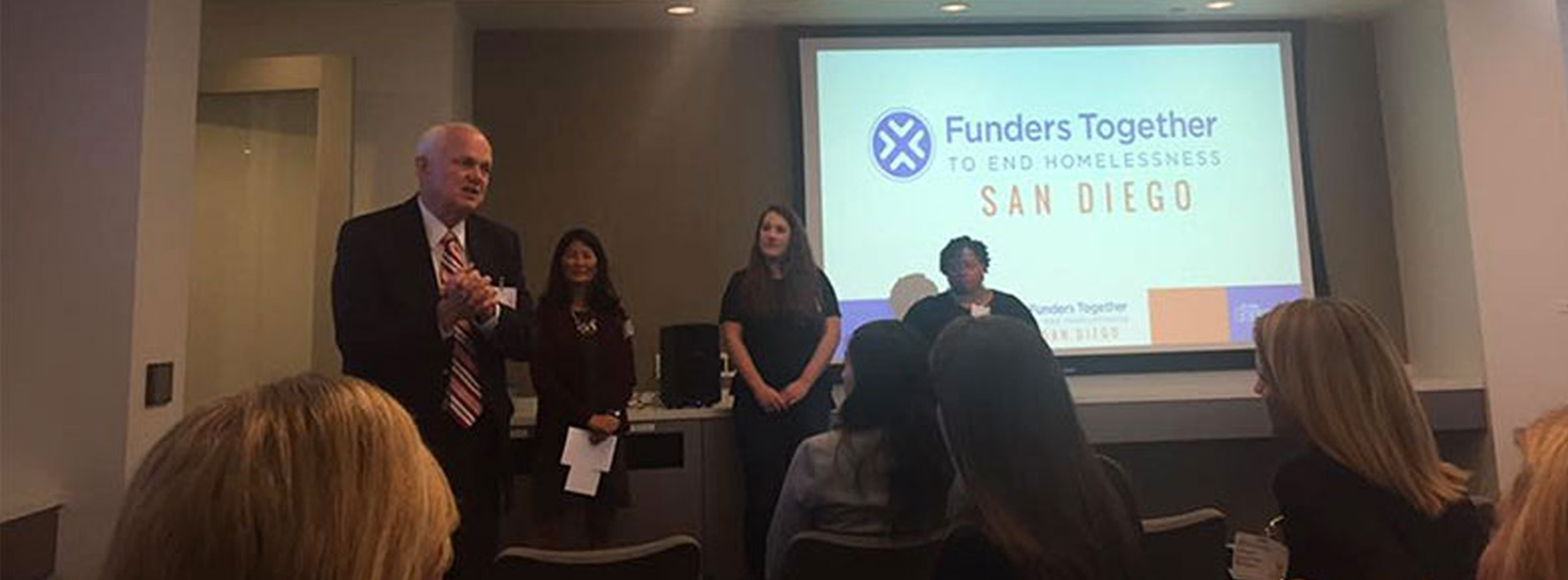
December 13
Understanding the impact that homelessness has on health and wellness in our region is one of the central pillars of our work, so we started our morning with a discussion with funders about homeless best practices in four other communities. Organized by Funders Together to End Homelessness San Diego (FTEHSD), this assessment went beyond the structure and people and dug into the “secret sauce” of each community’s efforts to end homelessness. We were curious to find out what these communities thought helped them succeed and move the needle in their region. We also looked at one community that hasn’t been as successful, although they are starting to turn the corner. Folks from Santa Clara County, Philadelphia, Houston, and Seattle were generous with their time while talking with staff at Good, Inc. We learned that political will is a necessary component of addressing homelessness, but it has to be the right kind, almost singularly focused on the end goal, and willing to take the heat when there are problems. Understanding community perceptions and using data-driven approaches are also high on the list of successful approaches. FTEHSD is looking to add these findings and recommendations to the community plan being rolled out at the Regional Task Force on the Homeless.
That evening I met with Michael McConnell, retired business owner and member of FTEHSD along with CEO Amanda Andere and Jennifer Olney from the national office of Funders Together to End Homelessness. It is always good to hear about what other funding groups are doing around the country and to incorporate their success into our work in San Diego County. Apparently, having a collaborative of funders actually pool their funding is hard to do in other communities. We are very lucky to have a growing group of funders interested in supporting the systemic changes we need in order to see progress toward ending homelessness.
December 14
At AHF we decided to celebrate our successes this year with an end of the year bowling party and dinner! Congratulations to high scorer Jonathan Dale (Communications Manager)! Other winners were Michele’s sons Luke and Ben—one was a terrific sport about being the low scorer, and the other was the most improved between games one and two. Also joining me were Michele Silverthorn, Senior Director of Programs, Bryan Fisher, Operations Manager, and Len Dodson, Interim CFO.
December 15
One of the challenges our grantees face is how to make their efforts financially sustainable, and social enterprise projects are one way to do that. CEO Ken Davenport and Program Director Alicia Quinn at Mission Edge gave me an update about their San Diego Accelerator & Impact Lab (SAIL) program. They are about to select organizations to participate in the next round of their program, and they are looking for ways to ensure providers in the health and wellness space are considered. SAIL takes teams through the process of developing a strong social enterprise with the end goal of providing a needed service as well as providing a different source of revenue that is sustainable.
After this meeting I joined Director B. H. Kim andKaison Tanabe from Impact Without Borders to catch up on their projects related to human-centered design. As they partner with others in the community, they are looking for feedback on the need and interest in this area for non-profit organizations.
Bullying can negatively affect the mental health of everyone involved, and it’s important to try to stop it in its tracks. Though it was an emotionally tough way to end the day, I went to a discussion in the evening introducing Rachel’s Challenge to the San Diego community. Wow, what do you say to Darrell Scott when his daughter Rachel was the first person killed at Columbine High School in 1999? The story behind Rachel’s Challenge is inspiring as Rachel had drawn her hand on a piece of paper and said that hand would touch thousands. She put this piece of paper on the back of her dresser. It was found by her parents as they were cleaning out her room. Needless to say it was the inspiration for them to continue her vision and touch others through Rachel’s Challenge. This organization teaches students how to open their hearts to people who are different in an effort to reduce and eliminate bullying in schools. It was great to see Mel and Linda Katz and Kathlyn Mead, CEO at The San Diego Foundation, at the beautiful home of Craig Irving. I also met Keith Fisher who will be on the ground developing this project in San Diego.
December 17
Visiting with our colleagues outside of their business is a great way to learn more about them and the work they do. This evening I joined Executive Director Scott Suckow from the American Liver Foundation and Kioni Romero at A North Park Christmas. Yummy tamales and Christmas songs were the highlight of the celebration. Thanks for the invitation, Scott!
December 18
Staying informed about the work of other healthcare foundations is an essential element in making sure our efforts remain as innovative and impactful as possible. This morning I drove to Long Beach to meet with my fellow leaders of healthcare foundations to talk about the work we are doing locally as well as statewide and nationally. Those working primarily around children’s health are worried about the lack of funding for the Children’s Health Insurance Program (CHIP). Many are moving into some advocacy work in order to ensure access to care, sometimes in other states in an effort to shore up CHIP nationally. Several are focused on seniors and the funding challenges they face not only now but into the future. In the not so distant future there will be three times more seniors than there will be workforce! Still others talked about changing strategies and focusing on initiatives and movements as well as civic engagement.
Teamwork is essential to the work we do in the community, so in the afternoon, Michele and our suitemates in Suite 350 joined up at Escapism for a suite-building event and holiday get-together. The group of 12 was split into two rooms, the attic and the art gallery…and that is all I am allowed to mention, as the groups were sworn to secrecy to not share information about the rooms. All I can say is that there were secret passageways and many locks and combinations! Thank you to San Diego Grantmakers for putting together this fun afternoon.
December 19
One of the underserved populations whose health needs we sometimes forget about are those in prison. This morning Michele met with Bill Brown and Kate Beckel of the Prison Yoga Project. Prison Yoga Project is an international project, but Bill and Kate bring the project to San Diego. One important takeaway from Michele’s conversation was that their work is trauma informed, more than just yoga, and rises to the level of therapeutic intervention.
At our CEO/ED event, Michele discussed with Jeff Wieman, Executive Director of Angels Foster Family Network, a few of the ways their organization celebrates successes, and she wanted to learn more. She met with Jeff this morning and he talked about his masters work at USD in Executive Leadership and different models and approaches to leading a team. Michele was very appreciative of the conversation and looks forward to exploring more!
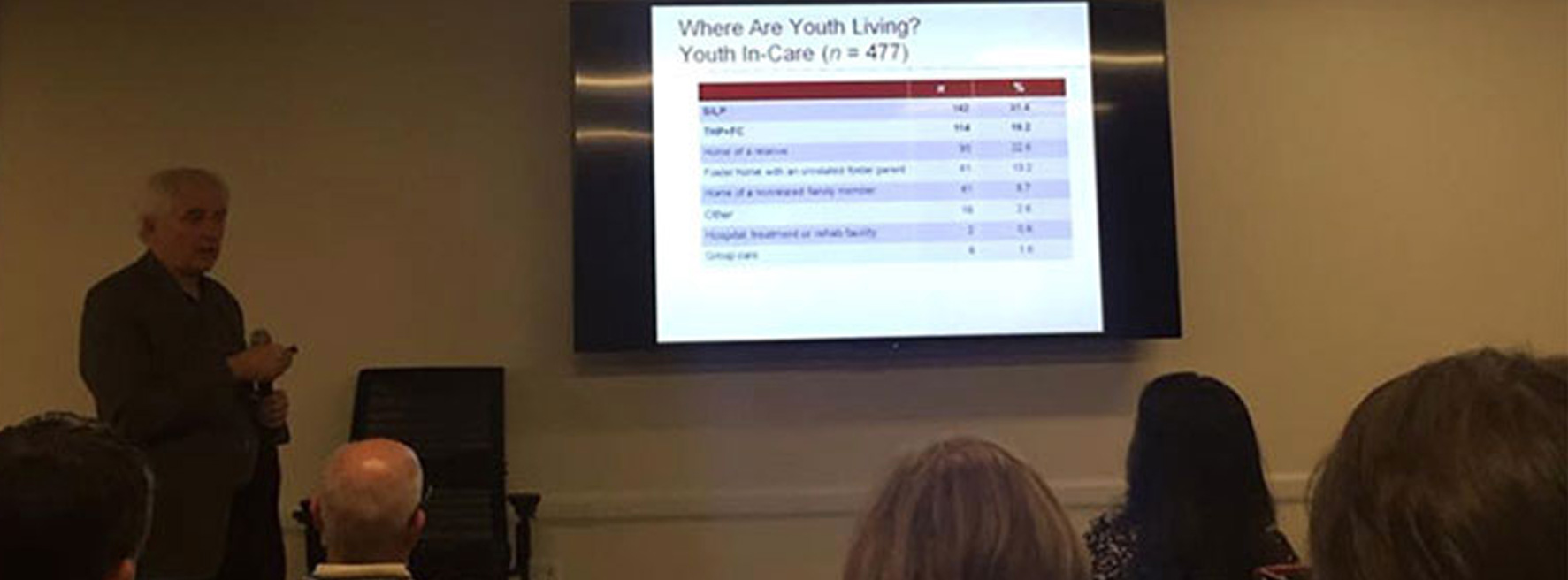
One of the best ways to prevent youth homelessness is to make sure that young people have the support and resources they need as they transition into adulthood, and no group of youth can use more support than foster youth. An inspiring and nice way to wrap up the day, the Fostering Futures Initiative brought in Dr. Mark Courtney to discuss his work on the California Youth Transitions to Adulthood Study. The results are tremendous! Extended foster care outcomes are overwhelmingly positive. A couple of key takeaways are that adding a year of care for foster youth doubles the odds that someone will get their GED, and the public spent $900 less on individuals per year when the youth was in extended foster care.
Upcoming Events
- Happy New Year! We hope that 2018 is filled with health and wellness for you, your family, and everyone in the community. Check out Live Well San Diego’s 31-Day Challenge for ideas about how to start off the new year on the right foot.
- January 26: Homelessness Point-in-Time Count for San Diego
Related News
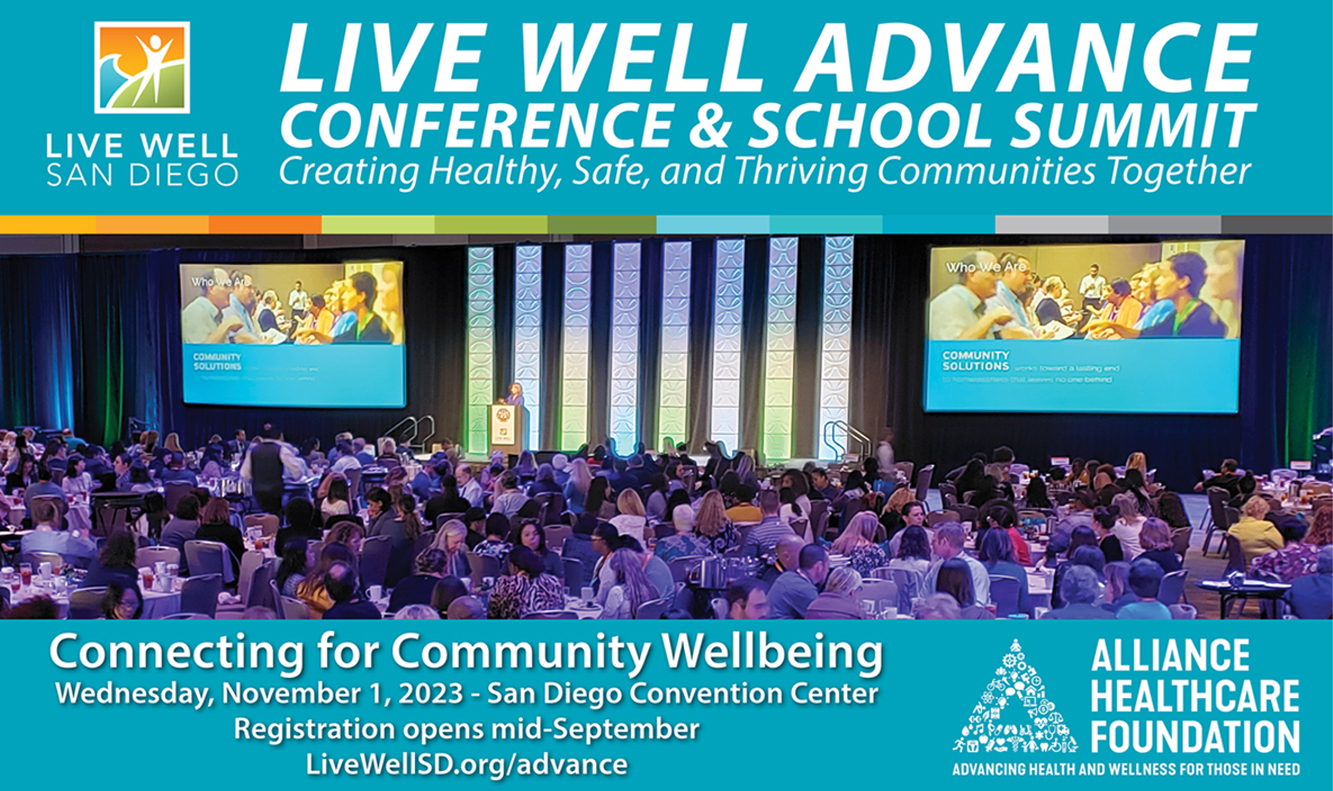
Jul 13, 2023
July partner news
Partner News + Opportunities Grants, Pro Bono Consulting and Conferences […]
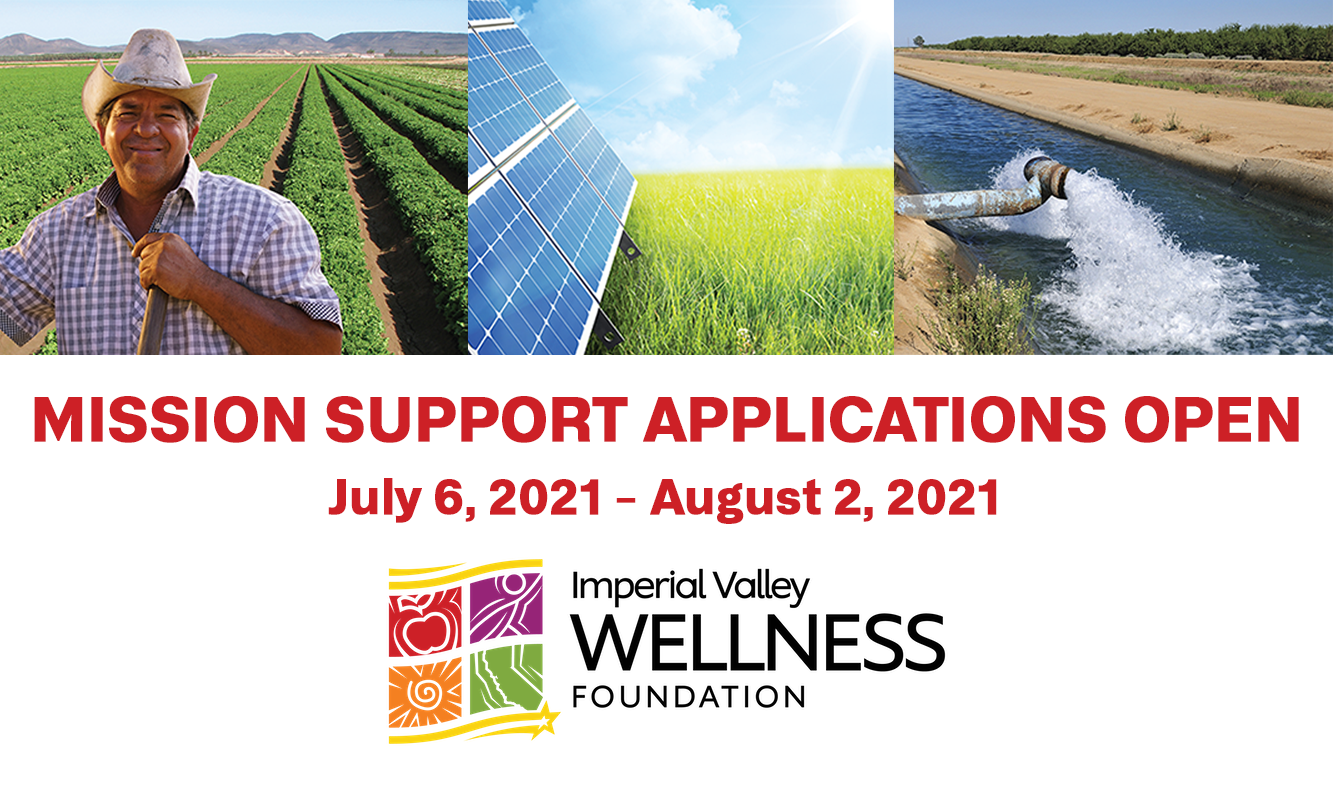
Jul 12, 2022
Imperial Valley Wellness Foundation: Opens 2022 Mission Support Applications
Imperial Valley Wellness Foundation Opens Mission Support Funding Application El […]

Jun 14, 2022
AHF News June 2022
Wanted: Senior Director of Strategy & External Relations and other […]
